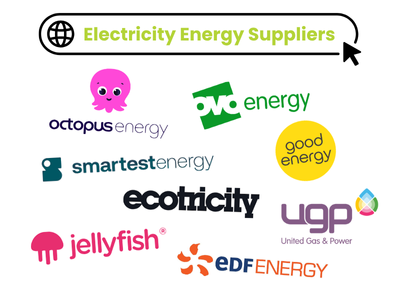A Business Guide to Green Energy

Let’s talk about energy. There are two main types: green and brown. Green energy comes from natural sources like the sun, wind, and water. Brown energy comes from fossil fuels, which emit a lot of CO2 when extracted. This is harmful due to the excess amount of carbon emissions being put out into the atmosphere.
For example, if you run any type of business and you’re on a brown energy contract, for every 1,000 kilowatts of energy used, you are producing around 225 kg of CO2 which directly goes into the atmosphere.
What is the difference between green and clean energy?
When you hear 'clean energy', you might think it means the same as 'green energy'. However, there are slight differences and if you know what they are, it may help with your next sustainable decision.
Green energy comes from natural renewable sources such as solar, wind, etc. It doesn’t emit any greenhouse gases and is not harmful for the environment.
Clean energy also produces zero greenhouse gases. However, the difference is that the source of the energy comes from non-renewable materials. For example, nuclear energy is considered clean energy, as it does not produce carbon emissions during operation but relies on finite resources such as uranium and can produce radioactive waste.
Both green and clean energy are good alternatives to fossil fuels and can help us move towards a more sustainable future. The main takeaway is understanding the energy source.
Green Energy Tariff
When it comes to green energy tariffs, there are two main ways that it is supplied.
- Fully renewable supply. This is when providers ensure that all energy is 100% from renewable sources (green energy only).
- Hybrid. This is when providers use a mix of renewable energy and fossil fuels to meet supply demand.
Ofgem issues certificates called Renewable Energy Guarantees of Origin (REGO). In simple terms, this confirms that the energy comes from renewable sources.
Why should businesses switch to green contracts?
There are many benefits for businesses to switch from a brown energy contract to a green one. It shows your business is aware of the social climate and supports the UK’s goal of reaching net zero by 2050.
Appeal to Environmentally Friendly Customers – Using green energy can attract customers who look for eco-friendly businesses. Showing your green initiatives lets people see your values and connects you with like-minded customers.
Government Incentives – Switching to green energy keeps your business in line with future regulations placed by the government to reduce carbon emissions. The government also offers incentives, like grants for using renewable energy, which can save your business money whilst helping the environment.
| Supplier | Brown (Fossil Fuels) |
Clean (Zero Carbon Emissions) |
Green (100% Renewable) |
|---|---|---|---|
| Ecotricity Ltd | ✖ | ✖ | ✓ |
| EDF Energy Ltd | ✓ | ✓ | ✖ |
| Engie Power Ltd | ✖ | ✓ | ✓ |
| Evolve Energy Supply Ltd | ✓ | ✖ | ✓ |
| Fuse Energy Supply Ltd | ✖ | ✖ | ✓ |
| Good Energy Ltd | ✖ | ✖ | ✓ |
| Green Energy Ltd | ✖ | ✖ | ✓ |
| Jellyfish Energy Limited | ✓ | ✓ | ✖ |
| Marble Power Ltd | ✓ | ✓ | ✖ |
| Maxen Power Supply Ltd | ✓ | ✓ | ✖ |
| Octopus Energy Ltd | ✖ | ✖ | ✓ |
| Ovo Electricty Ltd | ✖ | ✓ | ✓ |
| Shell Energy Ltd | ✖ | ✖ | ✓ |
| Smartest Energy Ltd | ✓ | ✖ | ✓ |
| So Energy Trading Ltd | ✓ | ✖ | ✓ |
| Squeaky Clean Energy Ltd | ✖ | ✖ | ✓ |
| Tomato Energy Ltd | ✖ | ✖ | ✓ |
| Tru Energy Ltd | ✖ | ✖ | ✓ |
| Unify Energy Ltd | ✓ | ✓ | ✖ |
| United Gas & Power Trading Ltd | ✓ | ✓ | ✖ |
| Utilita Energy Ltd | ✓ | ✓ | ✖ |
| Valda Energy Ltd | ✖ | ✖ | ✓ |
| Voltx Power Ltd | ✖ | ✖ | ✓ |
| Yu Energy Retail Ltd | ✓ | ✖ | ✓ |
Need help choosing the right supplier?
We provide bespoke energy contracts tailored to your needs, whether it's brown, clean, or green. As a B Corp organisation, we always encourage our customers to choose the greener option if possible. For a quick quote, fill in the box below and we’ll be in touch with you soon.
Written by Faith Labong at Purely Energy


